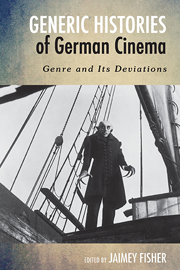Book contents
- Frontmatter
- Contents
- Acknowledgments
- Introduction: Toward Generic Histories—Film Genre, Genre Theory, and German Film Studies
- 1 Parallel Modernities: From Haunted Screen to Universal Horror
- 2 The Essay Film and Its German Variations
- 3 The Limits of Futurity: German Science-Fiction Film over the Course of Time
- 4 The Situation Is Hopeless, but Not Desperate: UFA's Early Sound Film Musicals
- 5 Resisting the War (Film): Wicki's “Masterpiece” Die Brücke and Its Generic Transformations
- 6 Ironizing Identity: The German Crime Genre and the Edgar Wallace Production Trend of the 1960s
- 7 From Siodmak to Schlingensief: The Return of History as Horror
- 8 Producing Adaptations: Bernd Eichinger, Christiane F., and German Film History
- 9 Exceptional Thrills: Genrification, Dr. Mabuse, and Das Experiment
- 10 The Heimat Film in the Twenty-First Century: Negotiating the New German Cinema to Return to Papas Kino
- 11 The Romantic Comedy and Its Other: Representations of Romance in German Cinema since 1990
- 12 Yearning for Genre: The Films of Dominik Graf
- Bibliography
- Notes on the Contributors
- Index
9 - Exceptional Thrills: Genrification, Dr. Mabuse, and Das Experiment
Published online by Cambridge University Press: 05 December 2013
- Frontmatter
- Contents
- Acknowledgments
- Introduction: Toward Generic Histories—Film Genre, Genre Theory, and German Film Studies
- 1 Parallel Modernities: From Haunted Screen to Universal Horror
- 2 The Essay Film and Its German Variations
- 3 The Limits of Futurity: German Science-Fiction Film over the Course of Time
- 4 The Situation Is Hopeless, but Not Desperate: UFA's Early Sound Film Musicals
- 5 Resisting the War (Film): Wicki's “Masterpiece” Die Brücke and Its Generic Transformations
- 6 Ironizing Identity: The German Crime Genre and the Edgar Wallace Production Trend of the 1960s
- 7 From Siodmak to Schlingensief: The Return of History as Horror
- 8 Producing Adaptations: Bernd Eichinger, Christiane F., and German Film History
- 9 Exceptional Thrills: Genrification, Dr. Mabuse, and Das Experiment
- 10 The Heimat Film in the Twenty-First Century: Negotiating the New German Cinema to Return to Papas Kino
- 11 The Romantic Comedy and Its Other: Representations of Romance in German Cinema since 1990
- 12 Yearning for Genre: The Films of Dominik Graf
- Bibliography
- Notes on the Contributors
- Index
Summary
A major contention of Rick Altman's sweeping study Film/Genre (1999) is that traditional genre criticism all too routinely assumes generic fixity at the expense of generic historicity. “Genre films” are often considered to have fixed narrative patterns and to repeat a relatively unchanging set of codes. Moreover, genre films are thought to be derivative, commercial in both aim and scope, and as a consequence not art. Fritz Lang's Rancho Notorious (1952), to take one example, may be read as a “classic” Western in this regard, exhibiting clear-cut and enduring conventions: the mythical settings on the nineteenth-century American frontier, the encounter between law and lawlessness, and the use of stock characters such as cowboys, outlaws, and “noble” Native Americans. While traditional genre criticism has deemed such elements to be timeless and transhistorical, Altman notes that this use of genres overlooks the historical ebb and flow that consolidates not only specific genres but also the concept of genre itself. “Stressing the apparently representative straight stretches of the mighty genre river rather than its tortuous tributaries, its riverbed-defying floods, or its tidewater-dominated estuary, recent genre theory has devoted too little attention to the logic and mechanisms whereby genres become recognizable as such.” Traditional genre criticism has not drawn sufficient attention to the varied contestations and negotiations that consolidate genre categorization. Challenging the notion that genre categories exist outside the flow of time, Altman argues that the categories themselves, in close conjunction with the generic cues through which they are constituted, are always already embedded in a historical trajectory, a “mighty genre river,” and are thus always in flux.
- Type
- Chapter
- Information
- Generic Histories of German CinemaGenre and its Deviations, pp. 197 - 220Publisher: Boydell & BrewerPrint publication year: 2013

